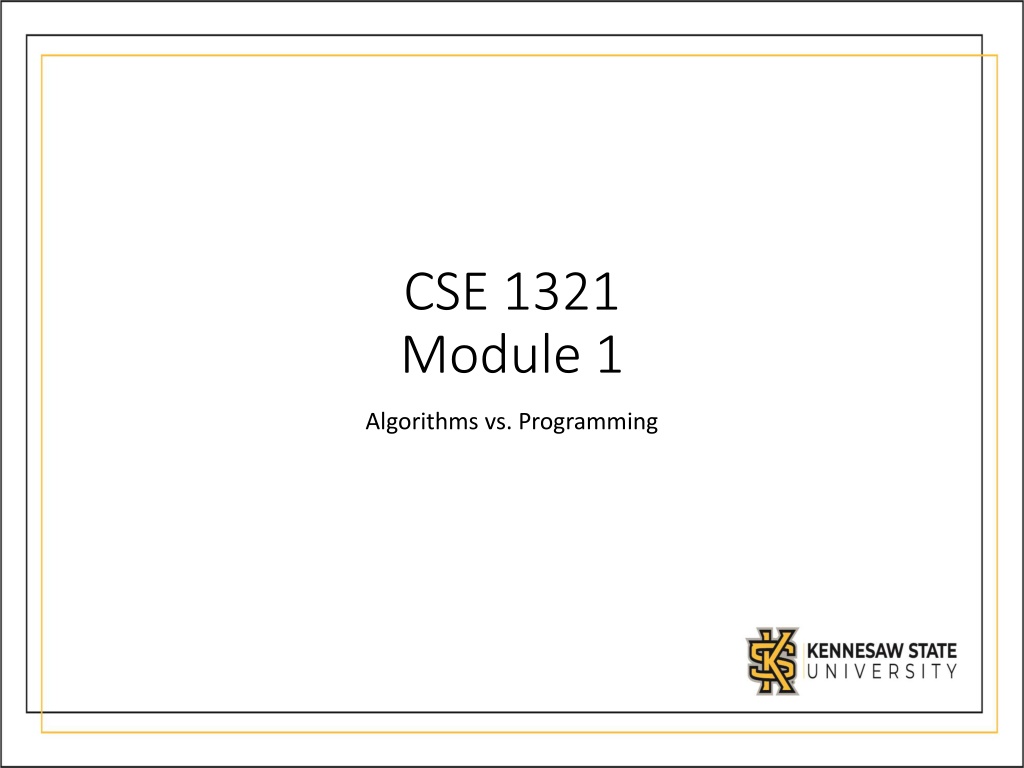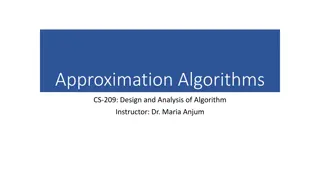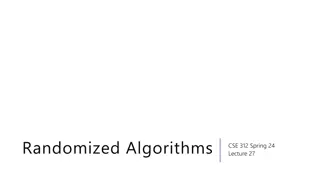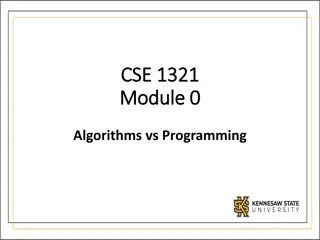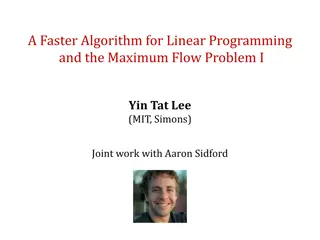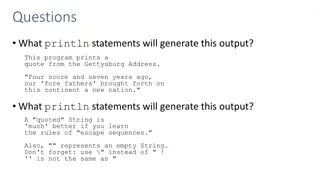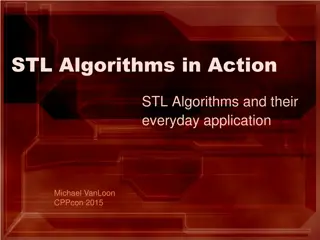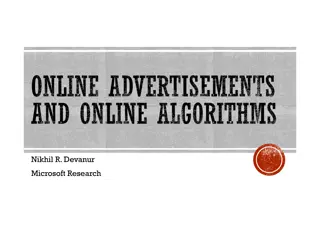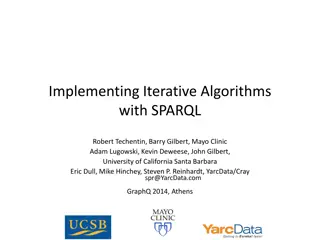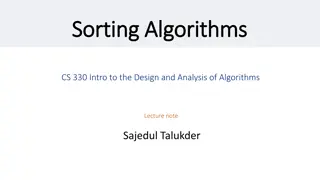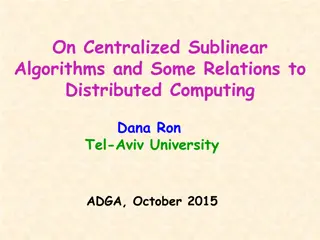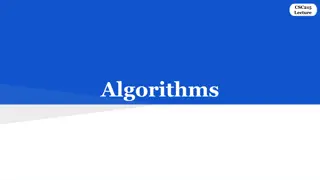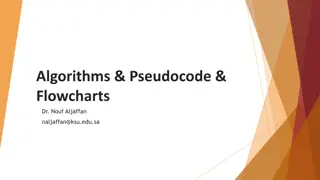Understanding Algorithms and Programming Fundamentals
Learn about algorithms, programming, and abstraction in computing. Explore the definition and properties of algorithms, the relationship between algorithms and programming, and the concept of abstraction. Discover how algorithms are like recipes and how abstraction simplifies complex tasks in computing.
Download Presentation

Please find below an Image/Link to download the presentation.
The content on the website is provided AS IS for your information and personal use only. It may not be sold, licensed, or shared on other websites without obtaining consent from the author. Download presentation by click this link. If you encounter any issues during the download, it is possible that the publisher has removed the file from their server.
E N D
Presentation Transcript
CSE 1321 Module 1 Algorithms vs. Programming
Motivation To learn algorithmic thinking with emphasis on pseudocode development; To understand what an algorithm is and how to write an algorithm; To describe the concept of abstraction To describe the relationship between algorithms and programming
Topics 1. Algorithms 1. Definition 2. Properties of Good Algorithms 3. Describing Algorithms 4. Examples 5. Components of Algorithms 2. Fine, then what is Programming?
What is an Algorithm? What it s not: a logarithm** What it is: A set of logical steps to accomplish a specific task A set of direction/instructions You use them everyday, even right now Algorithms contain: Data Instructions that work on that data **.. Which shares the same letters as algorithm
Algorithms: the visual Too much screen time Input Data Algorithm Output Data
Algorithms: a Recipe Chocolate Chip Cookies Ingredients: 2 1/4 cups flour 1 tsp baking soda 3/4 cup brown sugar 3/4 cup granulated sugar 12oz. semi-sweet chocolate chips 1 tsp salt 2 eggs 1 tsp vanilla ext. 1 cup soft butter Where s the: - Input data? - Algorithm? - Output data? Instructions Preheat oven to 375 . Combine flour, salt, baking soda, in bowl, set mixture aside. Combine sugars, butter, vanilla, beat until creamy. Add eggs and beat. Add dry mixture and mix well. Stir in chocolate chips Drop mixture by teaspoons onto ungreased cookie sheet Bake 8 to 10 minutes
Abstraction the level of detail 1. a general idea or term 2. an impractical idea; visionary and unrealistic 3. general characteristics apart from concrete realities, specific objects or actual instances (Random House Dictionary of the English Language) In computing: Abstraction refers to the LOGICAL GROUPING of concepts or objects We want to hide the details (in functions later) We like to think at a high level of abstraction (no details) Too many details overwhelm us!
Abstraction Example Someone tell me to turn off the lights
What is Wrong with this Algorithm? (From back of shampoo bottle) Directions: Wet Hair Apply a small amount of shampoo Lather Rinse Repeat Lesson learned: Just because we have algorithm doesn t mean it s a good one
Properties of Good Algorithms Good algorithms are: Precise why? Unambiguous why? Complete why? Correct why? Simple why? Contain levels of abstraction why?
Describing Algorithm Can be created using: Natural language (e.g. English) Pictures or flowcharts Pseudocode or a specific programming language We ll use pseudocode in this course It s a mixture of languages Not concerned with syntax, but concepts You ll use it through the rest of your career
Example: Natural Language Algorithm 1. START by make a list of courses you want to register for, in order of priority. 2. Number of hours = 0. 3. Choose highest priority class on list. 4. IF the chosen class is not full and its class time does not conflict with classes already scheduled, THEN register for the class: 4.a. Add the class to the schedule. 4.b. Add the class hours to the number of hours scheduled. 5. Cross that class off of your list. 6. Repeat steps 3 through 5 until the number of hours scheduled is >= 15, or until all classes have been crossed. 7. END ALGORITHM.
Example: Flowchart Algorithm START Make list of classes you want to take Num Hours = 0 Choose highest priority class on list yes Is this class full? no yes Is there a time conflict? no Add the class to your schedule. Add class hours to Num Hours. Cross the class off your list. yes Num Hours >= 15? no yes More classes on list? END no
Components of Algorithm Any computing algorithm will have AT MOST five kinds of components: Data structures to hold data Instructions to change data value Conditional expressions to make decisions Control structures to act on decisions Modules to make the algorithm manageable by abstraction (i.e., grouping related components)
Fine! Then what is Programming? Programming requires two skills: Algorithmic thinking (hard!) Knowledge of programming language syntax The syntax is the easy part Programming: 1. Start by developing a good algorithm 2. Then, convert into a language-specific syntax
How to Learn Programming We use pseudo-code to focus on learning algorithmic thinking Not using a computer to compile and run your program forces you to mentally execute your program and debug it! Too many programmers try to program by brute force and twiddling in an IDE. Wrong approach!
Summary Programming starts with algorithm development An algorithm is just a set of instructions Abstraction is just the level of detail A good algorithm exhibits precision, clarity, completeness, correctness, and simplicity. An algorithm can be described using a natural language, pictures and diagrams, and pseudocode or a specific programming language.
